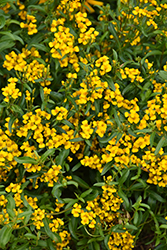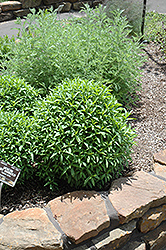
Plant Finder
Height: 30 inches
Spread: 18 inches
Sunlight:
![]()
Hardiness Zone: (annual)
Other Names: Mexican Mint Marigold, Texas Tarragon, Sweet Mace
Description:
This variety has foliage with the fragrance of anise; used for flavoring food; striking daisy like flowers in summer; prefers sun and is drought tolerant
Edible Qualities
Mexican Tarragon is an annual herb that is commonly grown for its edible qualities, although it does have ornamental merits as well. The fragrant narrow compound green leaves are usually harvested from early to late summer. The leaves have a sharp taste and a strong fragrance.
The leaves are most often used in the following ways:
- Cooking
- Drying
- Seasoning
Planting & Growing
Mexican Tarragon will grow to be about 30 inches tall at maturity, with a spread of 18 inches. Its foliage tends to remain dense right to the ground, not requiring facer plants in front. Although it's not a true annual, this plant can be expected to behave as an annual in our climate if left outdoors over the winter, usually needing replacement the following year. As such, gardeners should take into consideration that it will perform differently than it would in its native habitat.
This plant is quite ornamental as well as edible, and is as much at home in a landscape or flower garden as it is in a designated herb garden. It should only be grown in full sunlight. It is very adaptable to both dry and moist growing conditions, but will not tolerate any standing water. It is not particular as to soil type or pH. It is highly tolerant of urban pollution and will even thrive in inner city environments. Consider applying a thick mulch around the root zone in winter to protect it in exposed locations or colder microclimates. This species is not originally from North America. It can be propagated by division.
Mexican Tarragon is a good choice for the edible garden, but it is also well-suited for use in outdoor pots and containers. It can be used either as 'filler' or as a 'thriller' in the 'spiller-thriller-filler' container combination, depending on the height and form of the other plants used in the container planting. It is even sizeable enough that it can be grown alone in a suitable container. Note that when growing plants in outdoor containers and baskets, they may require more frequent waterings than they would in the yard or garden.

